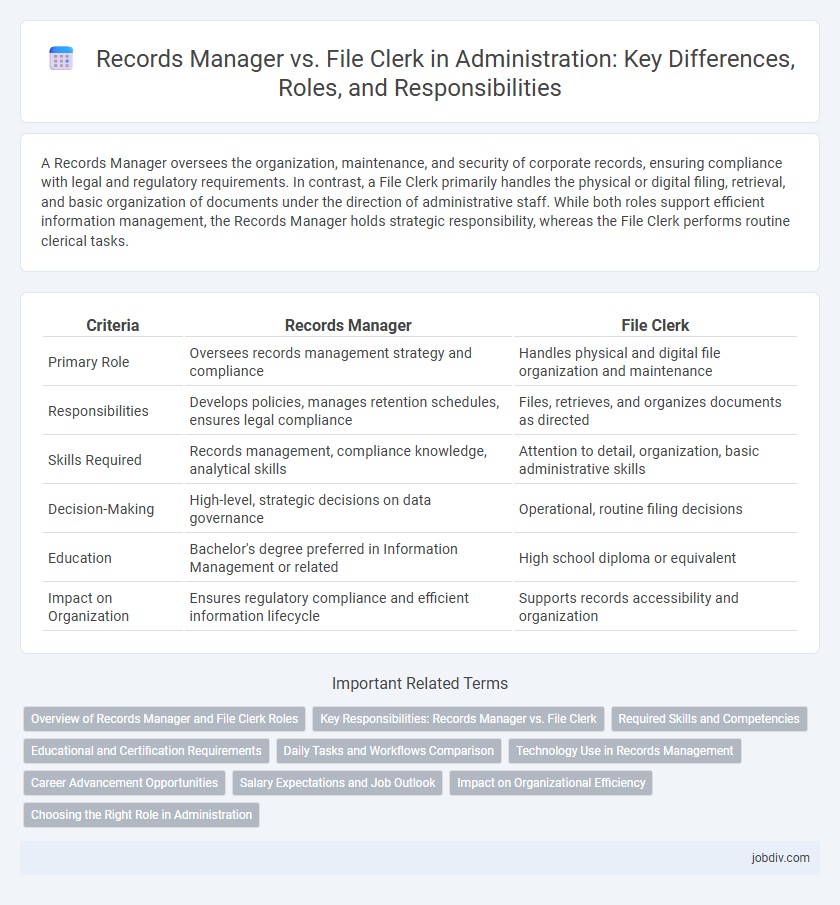A Records Manager oversees the organization, maintenance, and security of corporate records, ensuring compliance with legal and regulatory requirements. In contrast, a File Clerk primarily handles the physical or digital filing, retrieval, and basic organization of documents under the direction of administrative staff. While both roles support efficient information management, the Records Manager holds strategic responsibility, whereas the File Clerk performs routine clerical tasks.
Table of Comparison
| Criteria | Records Manager | File Clerk |
|---|---|---|
| Primary Role | Oversees records management strategy and compliance | Handles physical and digital file organization and maintenance |
| Responsibilities | Develops policies, manages retention schedules, ensures legal compliance | Files, retrieves, and organizes documents as directed |
| Skills Required | Records management, compliance knowledge, analytical skills | Attention to detail, organization, basic administrative skills |
| Decision-Making | High-level, strategic decisions on data governance | Operational, routine filing decisions |
| Education | Bachelor's degree preferred in Information Management or related | High school diploma or equivalent |
| Impact on Organization | Ensures regulatory compliance and efficient information lifecycle | Supports records accessibility and organization |
Overview of Records Manager and File Clerk Roles
Records Managers oversee the organization, maintenance, and secure storage of corporate records, ensuring compliance with legal and regulatory requirements. File Clerks handle the physical and digital filing, retrieval, and basic categorization of documents, supporting efficient access and recordkeeping. Both roles are essential for effective information management but differ significantly in scope and responsibility levels within administrative operations.
Key Responsibilities: Records Manager vs. File Clerk
Records Managers oversee the development, implementation, and enforcement of records management policies to ensure compliance with legal and regulatory requirements, and they coordinate the organization, retention, and secure disposal of both physical and electronic records. File Clerks handle the day-to-day organization and maintenance of physical and digital files, ensuring accurate filing, retrieval, and updating of documents according to established procedures. While Records Managers focus on strategic recordkeeping and policy adherence, File Clerks provide operational support by managing document logistics and accessibility.
Required Skills and Competencies
Records Managers require advanced organizational skills, proficiency in records management software, and knowledge of compliance regulations to ensure accurate document control and data protection. File Clerks need strong attention to detail, basic computer skills, and efficiency in sorting and categorizing physical or digital files for easy retrieval. Both roles demand reliability and confidentiality, but Records Managers typically handle more complex data governance and strategic planning responsibilities.
Educational and Certification Requirements
Records Managers typically require a bachelor's degree in information management, business administration, or a related field, along with certifications such as Certified Records Manager (CRM) or Information Governance Professional (IGP). File Clerks often need a high school diploma or equivalent, with on-the-job training focused on organizing and maintaining physical and digital files. Advanced certifications are less common for File Clerks, making the educational and credentialing demands significantly higher for Records Managers.
Daily Tasks and Workflows Comparison
Records Managers oversee the systematic organization, maintenance, and retrieval of critical documents, implementing retention policies and ensuring compliance with legal and organizational standards. File Clerks primarily focus on the physical handling, sorting, and archiving of files, maintaining filing systems and supporting Records Managers by updating records and processing document requests. Daily tasks for Records Managers involve strategic planning and auditing records workflows, while File Clerks concentrate on routine filing, labeling, and record distribution.
Technology Use in Records Management
Records Managers leverage advanced digital tools such as Electronic Document Management Systems (EDMS), automated indexing, and cloud-based storage solutions to ensure efficient, secure, and compliant records management. File Clerks primarily handle the physical organization and basic digital filing tasks using standard office software and scanning devices without extensive use of automation or data analytics. Technology use in Records Management significantly enhances accessibility, retention scheduling, and compliance monitoring, positioning Records Managers as critical actors in modern administrative environments.
Career Advancement Opportunities
Records managers typically have greater career advancement opportunities than file clerks due to their specialized skills in information governance, compliance, and digital records management. File clerks primarily handle routine document organization and retrieval tasks, which offer limited scope for upward mobility in administrative roles. Organizations prioritize records managers for leadership positions in records management, information security, and regulatory compliance, facilitating broader career growth paths.
Salary Expectations and Job Outlook
Records Managers typically earn between $60,000 and $90,000 annually, reflecting their advanced responsibilities in organizing and maintaining corporate records. File Clerks have a lower salary range, usually between $28,000 and $40,000 per year, due to the more clerical nature of their tasks such as filing and retrieving documents. Job outlook for Records Managers shows moderate growth at around 7%, driven by increased data management needs, while File Clerks face a declining job market with a projected decrease of 5% due to automation and digital recordkeeping.
Impact on Organizational Efficiency
A Records Manager enhances organizational efficiency by implementing systematic records retention policies, ensuring fast retrieval, and maintaining compliance with legal standards, thus minimizing risks and reducing operational delays. In contrast, a File Clerk primarily handles the physical filing and organization of documents, which supports day-to-day operations but lacks strategic impact on information governance. Effective Records Management directly contributes to streamlined workflows, better decision-making, and improved data security compared to the more transactional role of a File Clerk.
Choosing the Right Role in Administration
Selecting between a Records Manager and a File Clerk hinges on organizational needs and complexity of records management. A Records Manager oversees the entire records lifecycle, ensuring compliance, security, and efficient retrieval, ideal for businesses with extensive or regulated documentation. In contrast, a File Clerk handles daily filing tasks, organizing and maintaining physical or digital files, suited for environments requiring routine document management without extensive oversight.
Records Manager vs File Clerk Infographic

 jobdiv.com
jobdiv.com